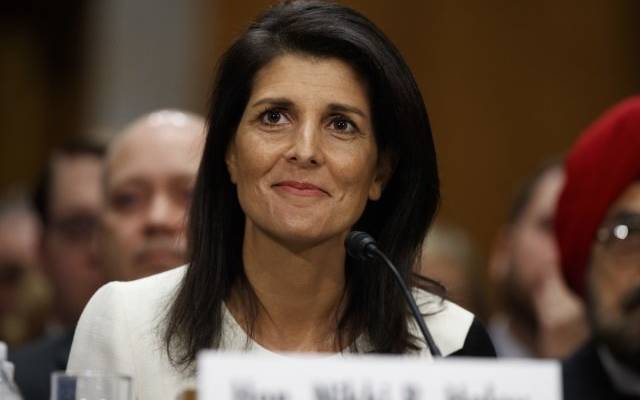Ambassador-designate Haley expressed outstanding support for Israel during her confirmation hearing at the Senate’s Foreign Relations Committee.
South Carolina Governor Nikki Haley declared her support for moving the US Embassy in Israel from Tel Aviv to Jerusalem, a shift firmly endorsed by President-elect Donald Trump but one that some threaten could trigger increased violence in the Middle East.
Haley, Trump’s pick to be the US ambassador to the United Nations, told the Senate Foreign Relations Committee on Wednesday that she “absolutely” backs the embassy move because that’s what Israel and congressional Republicans want.
Congress ordered the embassy relocation more than 20 years ago, but presidents ever since, Republican and Democrat, have refused to comply. Several Republican senators have proposed legislation that would withhold 50 percent of the State Department’s 2017 budget until the embassy move from Tel Aviv to Jerusalem is completed.
Haley assailed the Obama administration for failing to block a UN Security Council (UNSC) resolution that condemned Israel’s presence in eastern Jerusalem, Judea and Samaria. She pledged to reject future measures that she said unfairly targeted the Jewish state.
Haley said she won’t go to UN headquarters in New York and “abstain when the UN seeks to create an international environment that encourages boycotts of Israel.” She told the committee the UN resolution was “a terrible mistake” that makes a peace agreement between the Israelis and the Palestinians harder to achieve.
South Carolina, under the leadership of Haley, became the first US state to take action against anti-Israel boycotts. The state law now bars public entities from contracting with companies that boycott “based on race, color, religion, gender or national origin.” While Israel is not mentioned in the text, the premise of the law is that the Boycott, Divestment, Sanctions (BDS) movement discriminates against Israel and damages South Carolina’s economy.
She also slammed the UN’s “outrageous bias against our close ally Israel.”
She backed up her charge with numbers: In the recently concluded General Assembly session, “the UN adopted twenty resolutions against Israel and only six targeting the rest of the world’s countries combined.” Over the past ten years, she added, the UN Human Rights Council (UNHRC) “has passed 62 resolutions condemning the reasonable actions Israel takes to defend its security. Meanwhile, the world’s worst human rights abusers in Syria, Iran, and North Korea received far fewer condemnations. This cannot continue.”
Israel’s ambassador to the UN Danny Danon thanked Haley in a statement issued during the hearing for her “unequivocal support and her clear statement regarding the UN’s discrimination against Israel.”
“We thank Ambassador-designate Haley, a true friend of Israel, for her unequivocal support and her clear statement regarding the UN’s discrimination against Israel. We look forward to working together with her to undo the damage done by the shameful Security Council resolution, and to lead towards a new era at the UN which includes real reforms that will put an end to the biased obsession with Israel,” Danon stated.
Haley acknowledged she is new to international diplomacy. While the UN has had many successes, she said, citing health and food programs that have saved millions of lives, “any honest assessment also finds an institution that is often at odds with American national interests and American taxpayers.”
‘Are we Getting What We Pay For’ at UN?
The United States contributes 22 percent of the organization’s budget, and Haley questioned whether such a sizable investment is worthwhile.
“We are a generous nation,” Haley said. “But we must ask ourselves what good is being accomplished by this disproportionate contribution. Are we getting what we pay for?”
Haley said she would focus on “fixing” the UN and agreed that money should not continue to be funneled into programs that don’t work. But she said she’s not in favor of a “slash and burn” strategy in which American dollars are used as leverage. She said she doesn’t agree with lawmakers who want to withhold any US financial contributions to the UN until the anti-Israel Security Council resolution is repealed.
Last December, Israel and its supporters lashed out at Obama for his decision to abstain and allow the UN Security Council to approve the resolution, which called the Israeli communities in Judea and Samaria “a flagrant violation under international law.”
By: AP and United with Israel Staff










